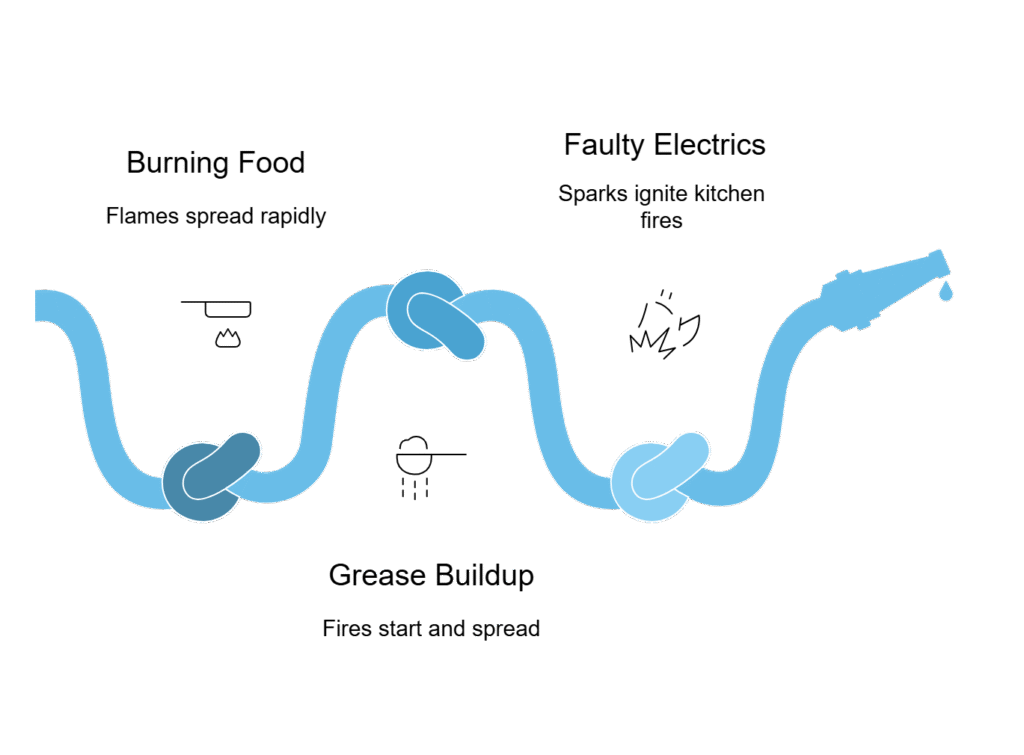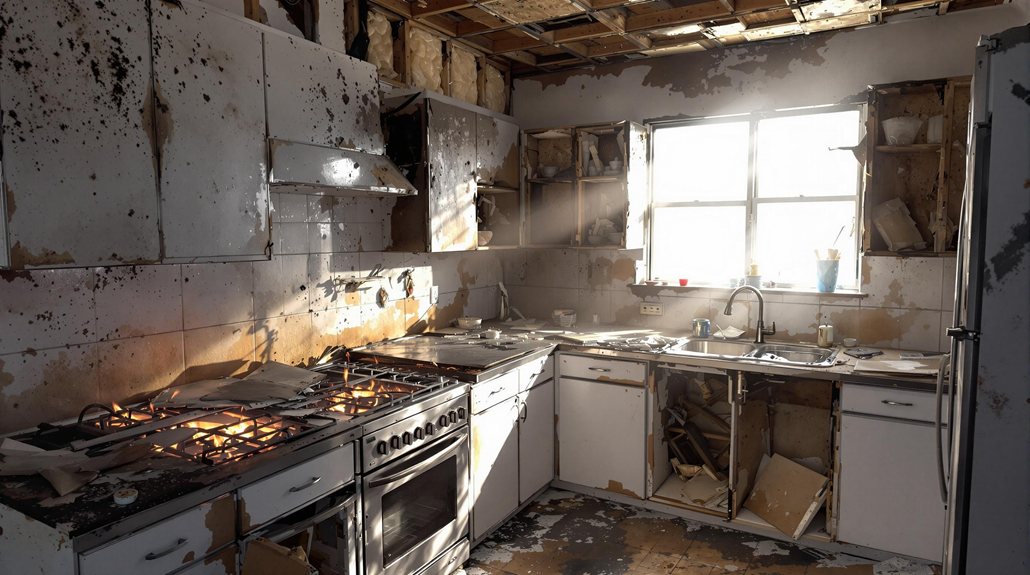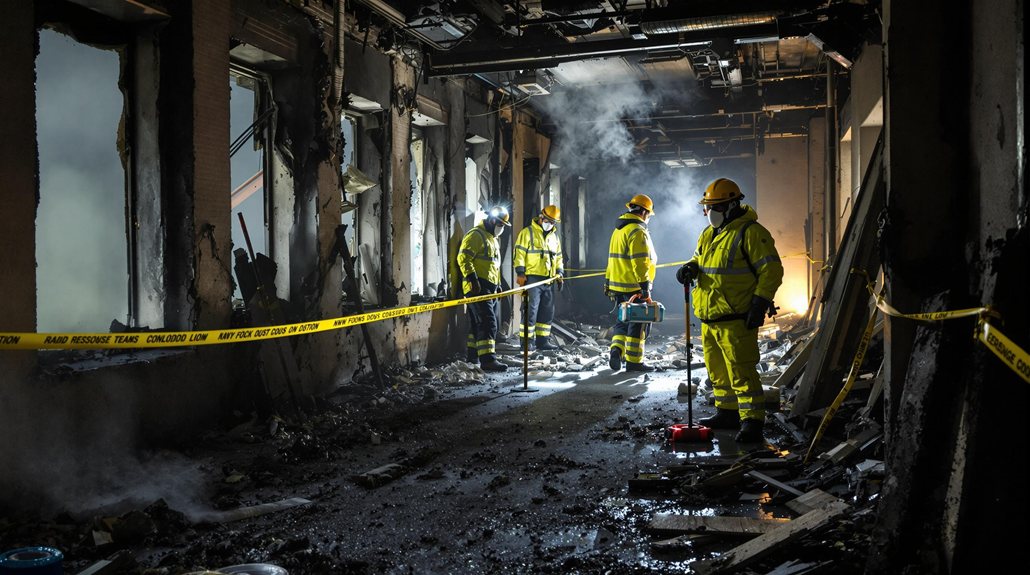
In our experience, the first 48 hours after a home fire often determine how successful the recovery will be. We have seen houses in the Surrey and Langley area recover well when urgent action was taken straight away, and we have also seen damage worsen when those first steps were delayed. Trust us when we say, your primary focus should be on securing your home and stopping further harm. We find that usually post-extinguishing recovery often begins with the Surrey Fire Service confirming the property is safe before fire restoration teams are allowed to begin work.
Why the First 48 Hours Matter
A fire leaves more behind than burnt walls or furniture. Smoke, soot, and water damage from firefighting efforts can quickly cause further problems. In those early hours, the priority is making sure the structure is safe, sealing off broken windows or damaged roofs to keep out the weather, and preventing any more deterioration.
Every hour without action makes the job harder and more costly. Even so, safety comes first. Only go back inside once emergency services confirm it is safe. Avoid restoring power or using appliances until an electrician has inspected the system and the utility provider has approved reconnecting.

Securing the Property
Straight after a fire, trained responders or restoration teams may board up openings, cover exposed areas, remove standing water, and identify urgent repairs. This stops rain, wind, and pests from making things worse.
It is also common to remove valuable or sentimental items early to protect them from smoke or water damage. Even items that appear ruined sometimes can be restored if treated quickly.
Common Kitchen Fire Triggers in Surrey Homes
Kitchen fires are one of the leading causes of home damage in Surrey. The most frequent triggers include unattended cooking, grease buildup, and electrical faults in appliances. Being aware of these risks helps prevent small incidents from becoming serious emergencies.

Unattended Cooking Hazards
It only takes a short distraction for food to burn and flames to spread. Leaving pans on the stove, oil heating unattended, or tea towels too close to burners are all common causes. A phone call, a knock at the door, or stepping away for “just a minute” can be enough. In our view, this is the most preventable cause of home fires. Stay in the kitchen while cooking, use timers as reminders, and keep flammable items away from heat.
Grease Buildup Risks
Grease residue is highly flammable and often builds up without notice on stovetops, inside range hoods, and in filters. Once it ignites, it spreads quickly. Wiping down surfaces after each use and cleaning filters regularly lowers the risk and protects your home.
Appliance Electrical Fires
Damaged cords, overloaded outlets, and faulty wiring are frequent sources of kitchen fires. These issues often go unnoticed until something sparks. This risk increases when using several appliances at once. Regularly check appliances, avoid overusing extension cords, and replace worn cables promptly.

Professional Help in the First Two Days
From what we have seen, getting professionals involved early speeds up repairs and prevents hidden problems such as water damage from firefighting. Early work can include removing damaged materials, drying water-affected areas, and cleaning surfaces before soot sets in.
| Action | Purpose | Benefit to You |
|---|---|---|
| Boarding up openings | Secures the property from weather and pests. | Prevents further damage and keeps the site safe. |
| Water extraction | Removes standing water left by firefighting efforts. | Stops mould growth and reduces structural damage. |
| Soot cleaning | Wipes away harmful residues before they set in. | Reduces permanent staining and corrosion. |
| Moisture detection | Uses tools to find hidden dampness in walls or floors. | Prevents long-term issues like rot or mould. |
Tools like moisture meters, time-lapse photography, and specialist cleaning solutions are often used during this time to stabilize the property and prepare for a complete restoration.
Health Considerations
Smoke particles can irritate your lungs, eyes, and skin. For people with asthma or breathing problems, the effects can be severe. Always wear protective gear if entering recently burned areas, and keep children and older adults away until air quality improves.
The Role of Insurance
Every policy is different. Some may cover all aspects of restoration, while others may have limitations or exclusions. Contacting your insurer promptly allows for faster claims processing and helps you understand what steps need to be taken for coverage to apply.
If you are in Surrey and need urgent help after a fire, you can contact the Surrey Fire Service non-emergency line at 604-543-6700. For emergencies, call 911 immediately.
Final Thoughts
You cannot fully prepare for the shock of a fire, but knowing what happens in the first 48 hours gives you a better sense of control. Acting quickly, staying safe, and making informed decisions protects both your property and the people in it.

Frequently Asked Questions
Will Insurance Cover All Fire Restoration Costs?
It depends on your policy. Most have limits, deductibles, and specific exclusions that affect what is paid out. The best approach is to read your policy and contact your insurer right away. This helps you understand what is covered and prepares you for any costs you may need to handle yourself.
How Long Should I Stay Elsewhere After Fire Damage?
The time before it is safe to return varies based on the level of damage and any remaining hazards. Smoke, soot, and structural issues can pose risks you might not see. In many cases, it can be days or even weeks before it is safe to go back inside.
What Dangers Do Smoke Residues Pose?
Smoke residues can harm both your health and your home. Fine particles may irritate your lungs, eyes, and skin, and they can stain or corrode surfaces if left untreated. Cleaning them within the first 48 hours helps reduce long-term damage.
Can Personal Items Survive Major Fire Damage?
Some items can be saved if action is taken quickly. Photographs, important documents, and sentimental belongings often have a chance, even after severe damage, if they are removed promptly and treated using proper restoration methods.
